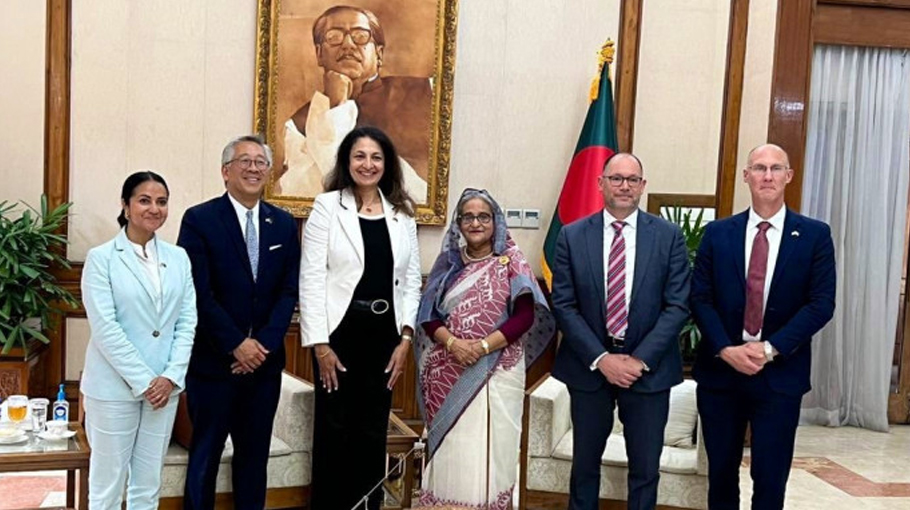US sees strong govt promise for fair poll
Uzra happy with violence-free rallies

The visiting US delegation team has witnessed a strong commitment from present government of Bangladesh to hold free, fair and peaceful elections in the country.
The delegation team led by US Under Secretary for Civilian Security, Democracy, and Human Rights Uzra Zeya came up with the remarks on Thursday as saying that she has witnessed Dhaka's strong commitment to hold free, fair and peaceful elections while Washington doesn't have any involvement in dialogues among political parties in Bangladesh.
"I've heard a strong commitment from the (Bangladesh's) honorable Prime Minister and all of the government ministers with whom I have had the pleasure to meet on Thursday in support of free and fair and peaceful elections," she told reporters after holding a meeting with foreign secretary Masud Bin Momen at State Guest House Padma in the capital.
The Under Secretary said the US, as part of its global human rights policy, supports free, fair and peaceful elections and "We want to do our part as a longtime partner of Bangladesh to help make this possible".
In replying to a question about whether the US suggests a dialogue among the political parties in Dhaka regarding the election issues, she said, Washington doesn't have any "direct involvement" in this.
Zeya said it is a matter of Bangladesh to decide regarding the "timetable" of the elections.
Expressing her satisfaction over the rallies organised separately on Wednesday by Awami League and BNP, she said, "We witnessed large political rallies, thankfully, free of serious violence, and I think this is a good harbinger that we would like to see replicated".
Mentioning that the US delegation came to Bangladesh in recognition of the importance of the US partnership with Bangladesh, Uzra Zeya underscored Washington's desire to deepen that partnership in support of the US's vision of a free and open Indo Pacific, which is "More resilient, more connected, more secure".
"I think we have had constructive, productive and engaging discussions," she added.
She said they discussed the need for free and fair elections, the ability of journalists to report without fear of retaliation or intimidation, collaboration to combat trafficking in persons, and the vital role that civil society plays in democracies advancing respect for human rights and fundamental freedoms, including freedom of expression and association.
"A prosperous future (of Bangladesh) depends on strong democratic institutions, and the broad participation of Bangladeshis in elections and the governance of their country," she observed.
The under Secretary said the US looks forward to deepening its engagement with Bangladesh over the next 50 years while its cooperation on climate change, development, economy, humanitarian assistance and security shows the range of Washington's strong partnership and future potential.
Regarding the Rohingya crisis, she said, the US supports efforts to create the conditions for the eventual safe, dignified, informed and voluntary return of Rohingyas, which do not currently exist.
"I am proud to announce that the United States is providing more than 74 million dollars in additional funding to support humanitarian response efforts in Burma (Myanmar) and Bangladesh.
The additional funding included nearly 61 million US dollars to support Rohingya internally displaced in Burma, as well as Rohingyas living here in Bangladesh, and Bangladeshi host community members, she added.
The Under Secretary also expressed US gratitude to Bangladesh for hosting a million plus Rohingyas. US Assistant Secretary for South and Central Asia Donald Lu and US Ambassador to Bangladesh Peter Haas were present from the US side.
Meanwhile, a press release issued on Thursday by the US embassy in Dhaka said that US Under Secretary for Civilian Security, Democracy, and Human Rights Uzra Zeya met with the Honorable Prime Minister Sheikh Hasina on Thursday. They discussed the strong and growing partnership between the United States and Bangladesh, including coordination on issues from humanitarian assistance to gender equality. They spoke about efforts to advance a prosperous future built on strong democratic institutions, including free and fair elections; the vital role of civil society and independent media; promoting human rights and fundamental freedom, including freedom of association and labor rights.
The Under Secretary and the Prime Minister also discussed Bangladesh’s generous hosting of Rohingya refugees and their continuing need for support from the global community. The United States is proud to have provided more than $2.1 billion in humanitarian assistance to support Rohingya refugees and host communities in Bangladesh and the region since August 2017.
The Under Secretary also shared that the United States is providing more than $74 million in additional humanitarian assistance to support the ongoing response efforts in Burma and Bangladesh, including nearly $61 million to support Rohingya internally displaced in Burma, Rohingya refugees in Bangladesh, and their host communities, including in Bangladesh, while urging continued support by other donors and potential donors, the press release added.
Given declining donor support and rising camp insecurity, the United States strongly encourages the Government of Bangladesh to expand livelihood opportunities for Rohingya refugees.
The United States is also maintaining pressure on Myanmar’s military regime to end the crisis and create the conditions for the eventual voluntary return of Rohingya to their homeland in a manner that is safe, dignified, informed, and sustainable.
The Under Secretary arrived in Bangladesh on July 11 on a four-day long visit. She is scheduled to stay in Dhaka till July 14. She is accompanied by Assistant Secretary for the Bureau of South and Central Asia Donald Lu and several other senior officials of the U.S. government from the Department of State, the U.S. Agency for International Development and the National Security Council.
They are meeting with senior government officials, civil society members, Rohingya refugees, and representatives from humanitarian organisations.
Staff Correspondent



